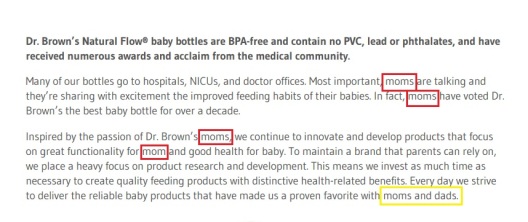Who says dads don’t take care of kids’ allergies? Bayer Global, makers of Children’s Claritin – that’s who.
It doesn’t take long to figure out who Bayer wants as its customer base when you visit its gender-specific website which insists dads aren’t parents who buy or provide medicine. Bayer doesn’t just offer a Smart Allergy Mom Toolkit – they’re so convinced that only moms matter they trademarked it.

But that’s not all. Bayer even offers the Claritin Mom Crew, which offers only moms free product samples and promotional items in exchange for positive reviews. Dads, it would seem, were not even given an opportunity to speak because the invite was never extended.

It’s all a tough pill to swallow for dads who remain dedicated as part of today’s modern families. It’s these same dads who hear constant viral stories of mothers who complain about having to do it all, then get little by way of backup from ad agencies who insist just that – moms must do it all.
Of course, we all know this not to be true. Dads also seek assistance when looking to administer medicine to allergy-suffering children. Dads are every bit equal, competent parents who care greatly about their children.
These are not your dads of yesteryear, depicted in 1950s sitcoms as aloof, unemotional and neglectful. Nor are they the spoofed, incompetent 1980s fathers of “Mr. Mom” and “Vacation” who needed corrected by their more sensible wives.
Bayer’s approach is both disappointing and troubling. It’s effectively telling fathers everywhere – you don’t matter. It’s a surprising and unfair omission from a company whose mission is “to achieve and maintain leadership positions in our markets” and to “respect the interests of all our stakeholders.”
It’s hard to imagine how all of these ideals can be accomplished when it’s not aiming to reach the dad market, nor respecting the members of that market.
Bayer’s #BeAnOutsider social media campaign is a clever one that encourages Claritin users to start enjoying the outdoors again. But it also offers a heavy dose of irony to dads: they already are outsiders.
Perhaps someday Bayer will let dads in and make them to feel like the true, equal parents they are without any bias toward who they think cares for kids today.
If Bayer truly knew its customer base, it would know differently.


 In other words, is society really taking mothers seriously when all the focus is placed on them to the exclusion of fathers? Do mothers really want this heap of responsibility when scores of moms incessantly plead for help in the home and caring for children? Do mothers really want it all, as ads so often suggest: motherhood, career, and control of the household and family? Is it fair to portray women solely as happy homemakers in half of the ads and as sex objects in the other half?
In other words, is society really taking mothers seriously when all the focus is placed on them to the exclusion of fathers? Do mothers really want this heap of responsibility when scores of moms incessantly plead for help in the home and caring for children? Do mothers really want it all, as ads so often suggest: motherhood, career, and control of the household and family? Is it fair to portray women solely as happy homemakers in half of the ads and as sex objects in the other half? All of this is detrimental to families, of course, because it impedes the family from flourishing as it should without recognizing fathers as equal, competent parents.
All of this is detrimental to families, of course, because it impedes the family from flourishing as it should without recognizing fathers as equal, competent parents. care of babies, or can’t bottle feed, or don’t want to. It’s all very troubling for a company that prides itself on
care of babies, or can’t bottle feed, or don’t want to. It’s all very troubling for a company that prides itself on 